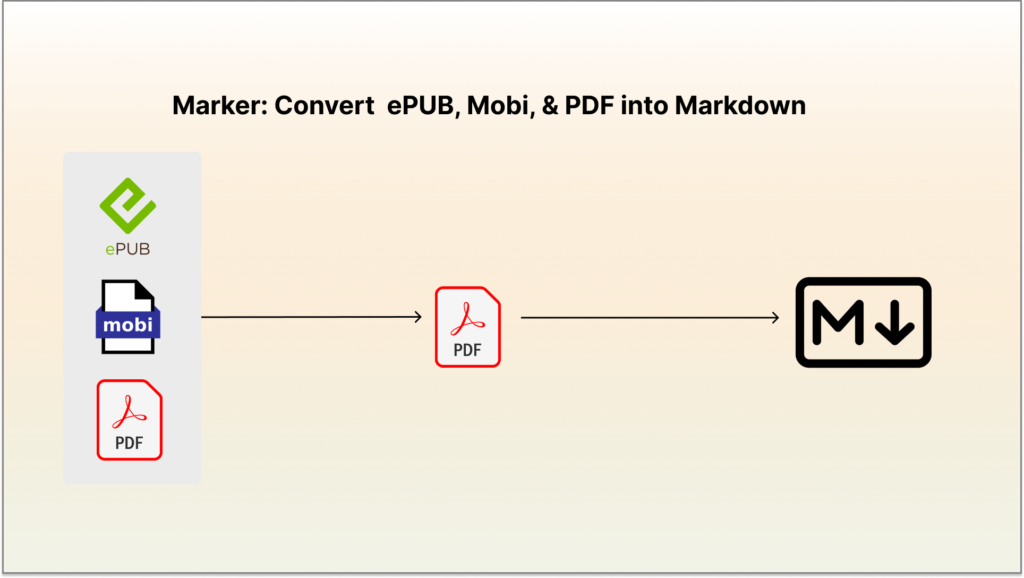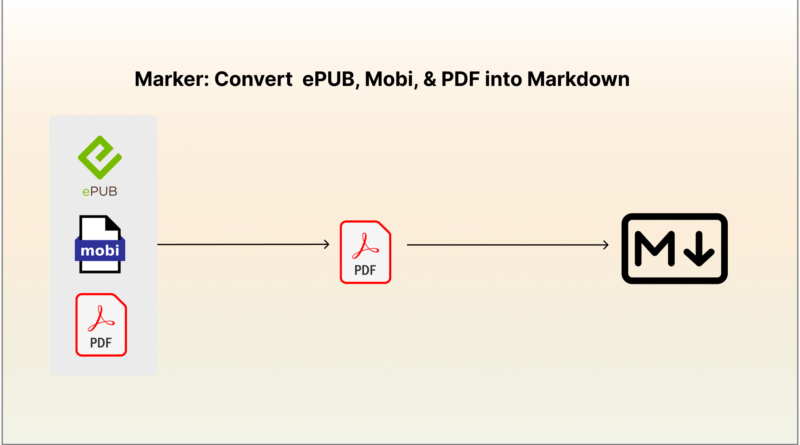Marker: A New Python-based Library that Converts PDF to Markdown Quickly and Accurately
In today’s digital age, the need to convert PDF documents into more manageable and editable formats has become increasingly important. This is particularly true for those dealing with academic and scientific materials, which often contain complex elements such as multi-language text, tables, code blocks, and mathematical equations. While there are existing solutions available for extracting text from PDFs, they often struggle to accurately maintain the original layout, formatting, and content. This is where Marker, a new Python-based library, comes into play.
Introducing Marker

Marker is a powerful and efficient library designed to convert PDF documents into markdown format quickly and accurately. Developed by a team of experienced programmers, Marker is specially optimized for handling books, scientific papers, and other high-density information documents. It supports a wide range of document types and is capable of accurately converting content in any language.
Key Features of Marker
- Accurate Conversion: Marker excels in accurately maintaining the original layout, formatting, and content of PDF documents. Unlike standard text converters, Marker handles complex elements like tables, code blocks, and mathematical equations with precision.
- Seamless Integration: Marker is designed to seamlessly integrate with your existing Python workflows. It can be easily installed as a Python package and used as a command-line tool or incorporated into your custom Python scripts.
- Efficient Processing: Marker has been finely tuned to efficiently handle large volumes of data. It utilizes GPU, CPU, or MPS platforms to optimize processing speed and accuracy, ensuring it operates within reasonable computational resource usage.
- Image Extraction: In addition to text conversion, Marker can also extract images from PDF documents and integrate them appropriately into the resultant markdown files. This feature allows for a comprehensive conversion of the entire PDF document.
- Language Support: Marker supports content in any language, making it a versatile tool for users dealing with documents in different languages.
How Marker Stands Out
Marker differentiates itself from other PDF to markdown conversion tools in several ways. Here are a few key aspects that make Marker an exceptional choice:
- Superior Accuracy: Marker’s accuracy in maintaining the integrity and layout of complex document formats is unparalleled. It ensures that the converted text remains true to the original content, minimizing the need for manual corrections.
- Tailored Approach: Marker has been carefully engineered to handle various types of PDFs. It particularly shines with digital PDFs, where the need for optical character recognition (OCR) is minimized, resulting in faster and more accurate conversions.
- Performance Metrics: Benchmarks comparing Marker to existing solutions highlight its superior performance in accurately converting PDFs to markdown. It efficiently handles high-density information documents, such as books and research papers, without sacrificing speed or accuracy.
- Adaptability: Marker is designed to be highly adaptable, providing excellent results across different document types and languages. Its flexibility makes it an invaluable resource for academics, researchers, and anyone involved in extensive document handling.
Limitations and Future Enhancements
While Marker offers exceptional conversion capabilities, it’s essential to acknowledge its limitations and areas for future improvement. The developers have identified a few areas where Marker may have room for enhancement:
- Equation Conversion: Occasionally, Marker may encounter challenges in converting equations to LaTeX format. While it generally performs well in this area, users may need to double-check equation conversions for complete accuracy.
- Table Formatting: Marker aims to accurately convert tables from PDFs into markdown format. However, in certain cases, minor issues with table formatting may arise. Users should be aware of this and be prepared to make manual adjustments if necessary.
Despite these minor limitations, Marker remains a highly reliable and efficient tool for converting PDFs to markdown. With its continuous development and community support, it’s likely that these limitations will be addressed in future updates.
Getting Started with Marker
To get started with Marker, follow these simple steps:
- Installation: Install Marker as a Python package using pip or your preferred package manager. The installation process is straightforward and well-documented.
- Import Marker: Import the Marker library into your Python script or use it from the command line.
- Convert PDF to Markdown: Use the Marker library to convert your PDF documents to markdown format quickly and accurately. Specify the input PDF file and the desired output file name or location.
- Explore Additional Features: Take advantage of Marker’s additional features, such as image extraction, to further enhance your document conversion process.
Conclusion
Marker represents a significant advancement in PDF to markdown conversion technology. It addresses the critical challenges faced by users who need to manage complex documents by providing a solution that not only converts text but also respects and reproduces the original formatting and structure. With its superior accuracy, seamless integration with Python workflows, and adaptability to different document types and languages, Marker is poised to become an essential resource for academics, researchers, and anyone involved in extensive document handling. As the volume and complexity of digital content continue to grow, having reliable tools like Marker to facilitate easy and accurate conversion will be paramount.
Explore 3600+ latest AI tools at AI Toolhouse 🚀.
If you like our work, you will love our Newsletter 📰




